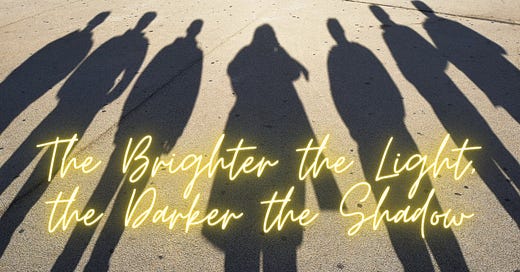The Brighter the Light, The Darker the Shadow
Exploring the Complex Relationship between Spiritual Leadership and the Shadow Self
As a newly ordained pastor, I was called to develop a new congregation near Chicago. My youthful idealism was quickly shattered by resistance from some members. I felt affronted by their challenges to my leadership and ideas for growth. My ego took over, and I responded defensively, trying to exert my authority. The experience was painful but necessary, revealing my shadow and teaching me a valuable lesson.
The idea of the brighter the light, the darker the shadow is rooted in the concept of the shadow self, which was coined by Swiss psychologist Carl Jung. The shadow self refers to the unconscious part of our personality that contains all the aspects of ourselves that we repress or deny. These aspects may include negative emotions, impulses, desires, and behaviors that we feel are unacceptable or inappropriate.
When someone enters into a spiritual leadership role, they often feel a strong sense of purpose and connection to a higher power. This can be an incredibly uplifting experience, but it can also bring to the surface aspects of their shadow self that they may not have been aware of before. For example, a spiritual leader who preaches about forgiveness may struggle with resentment and anger in their personal life. A leader who teaches about humility may secretly struggle with a desire for power and recognition.
This phenomenon is not unique to spiritual leaders, but it can be particularly pronounced in this group of people due to the nature of their work. As they help others to confront their own shadow selves and work through their personal struggles, they may find themselves confronting their own demons as well.
One possible explanation for this phenomenon is that spiritual leaders often feel a strong sense of responsibility for the well-being of others. This can lead them to neglect their own needs and emotions, which can then manifest in their shadow self. Another explanation is that the pressure to be a perfect role model can create a sense of cognitive dissonance when the leader's own behavior or emotions do not align with their teachings.
It's important to note that having a shadow self is not necessarily a bad thing. In fact, embracing and integrating the shadow can lead to greater self-awareness and personal growth. However, it's important for spiritual leaders to recognize and work through their own shadow selves in order to be effective and authentic in their roles.
The phenomenon of spiritual leaders having a dark shadow is a complex and fascinating topic. By exploring this idea further, we can gain a deeper understanding of the challenges faced by spiritual leaders and the importance of self-awareness and personal growth in this role.
I left the ministry almost thirty years ago, but the lessons I learned during that time have stayed with me. Confronting my shadow and slowly bringing it into the light was a valuable experience that continues to shape my life today.
As Carl Jung once wrote,
Knowing your own darkness is the best method for dealing with the darkness’s of other people.
Spiritual leaders, no matter their faith tradition, should not shy away from this important work. It can be painful, but it is essential for personal growth and effective leadership.





